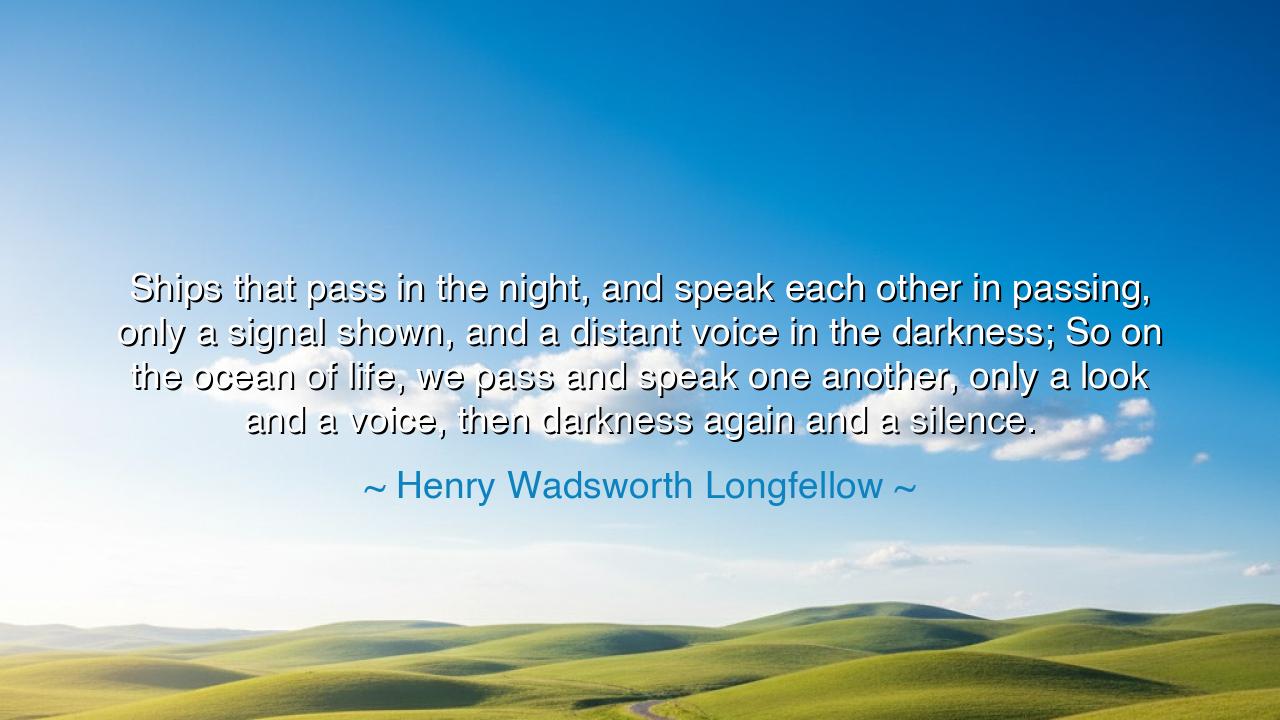
Ships that pass in the night, and speak each other in passing
Ships that pass in the night, and speak each other in passing, only a signal shown, and a distant voice in the darkness; So on the ocean of life, we pass and speak one another, only a look and a voice, then darkness again and a silence.






“Ships that pass in the night, and speak each other in passing, only a signal shown, and a distant voice in the darkness; so on the ocean of life, we pass and speak one another, only a look and a voice, then darkness again and a silence.” — so wrote Henry Wadsworth Longfellow, the poet of the human heart, whose words echo like the sound of waves against eternity. In this tender meditation, Longfellow captures the fleeting nature of human connection — how, in the vast sea of existence, our souls meet for a moment, touch by light or voice, and then drift apart into silence. It is a vision both sorrowful and beautiful, filled with the melancholy of transience and the quiet glory of encounter. Beneath its calm imagery lies the ancient truth that life is impermanent, and that even the briefest meeting between souls carries eternal weight.
The origin of this quote is found in Longfellow’s poem The Theologian’s Tale: Elizabeth, part of Tales of a Wayside Inn, published in 1863. The United States was in the midst of the Civil War — a time when separation, death, and longing filled the air like smoke. Longfellow himself had known deep personal sorrow: the death of his beloved wife Fanny, who had perished in a fire, and the grief of a nation tearing itself apart. In such a world, the image of ships passing in the night became more than a metaphor; it was a lament for all the love, friendship, and humanity lost to time and circumstance. Through this poetic image, Longfellow sought to express both the fragility of human bonds and the sacredness of each encounter we are given.
When he writes, “only a signal shown, and a distant voice in the darkness,” he speaks of the brief exchanges that define our lives — the moments when two human beings, each journeying on their own mysterious path, meet for an instant under the vast sky of existence. These meetings may be as small as a smile exchanged between strangers, or as profound as the brief love that transforms a lifetime. Yet, no matter how powerful the connection, the tide of time carries us onward, each to our own destiny. And so, like ships, we pass and fade, our lights growing dim behind us, until only the memory of that meeting remains, shimmering faintly in the darkness.
The ancients too understood this truth. Consider the story of Alexander the Great and the philosopher Diogenes. When Alexander, the conqueror of the world, stood before the ragged philosopher and asked if he desired anything, Diogenes replied, “Yes — stand out of my sunlight.” They met only once, and for a brief moment, two worlds — power and wisdom, ambition and simplicity — touched and then went their separate ways. Their exchange was fleeting, but its echo has lived for centuries. Like Longfellow’s ships, they crossed paths for but an instant; yet that instant revealed an eternal truth about pride and humility, need and freedom. Such are the encounters that shape the spirit — short, yet profound, vanishing like stars at dawn.
Longfellow’s image is also a meditation on human loneliness, that great ocean upon which every soul sails alone. We live surrounded by others, yet each of us carries an inner world that no one else can fully enter. Even those we love most are known to us only through glimpses — a look, a voice, a shared silence. The rest remains hidden beneath the waves. And yet, the poet reminds us, these brief encounters are not meaningless. They are the light that pierces the darkness — the proof that we are not adrift in solitude, but part of a greater voyage of souls, each illuminating the other for a moment before fading from view.
But within the sadness of this truth lies its beauty. For if life is short and our meetings few, then each word of kindness, each act of compassion, each moment of understanding becomes infinitely precious. To know that we are all ships in passing is to cherish every passing ship — to wave with gratitude when its light appears on the horizon, to listen when its voice calls across the dark. Longfellow’s wisdom is not despair, but reverence: he teaches us to see in every encounter a kind of holiness, as though God Himself had arranged that meeting upon the waters of time.
So, my child, learn from this: treat every soul you meet as sacred, for you do not know how long you will sail beside them. Speak gently, for your words may be the only light another traveler sees before night falls again. Do not withhold love, for it may never pass this way once more. And when those you cherish drift away beyond your sight, do not mourn as one abandoned, but give thanks for the moment your paths crossed — for even a single gleam in the darkness is proof that the sea of life is not empty, but filled with kindred lights, each moving toward its own unknown shore.
Thus, as Longfellow’s verse whispers across the centuries, remember: life is the ocean, and we are its passing ships. The encounters may be brief, the voices faint, but the meaning of those moments endures beyond the silence. For in the fleeting touch between souls, the eternal reveals itself — a signal of light in the great night of time, a promise that even in parting, we are never truly alone.






AAdministratorAdministrator
Welcome, honored guests. Please leave a comment, we will respond soon